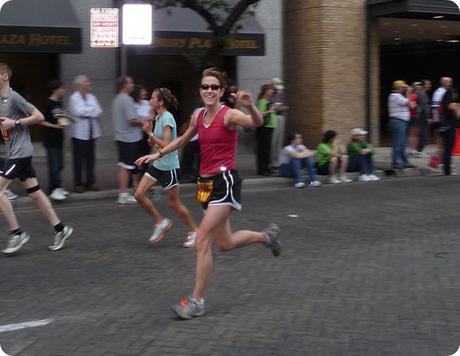If you read this blog, then you know I label myself as a “newer runner.” It is like reading a description for a house you might buy and seeing it has “newer carpet.” This just means that the carpet is not brand new, it has some wear and tear, but it can hardly be classified as old, decrepit and used up. It also does not have the history behind it like a seasoned carpet would. It has not gone through all of the highs and lows that life has to offer.
Hence, that “newer” carpet, just like the “newer” runner, still has a thing to learn about the ways of the world.
{And no, I have no clue if the “newer” carpet matches the “older” drapes. I guess it depends on the dye job.}
In my short running career, many other runners I have met ran track and/or cross country in high school and college. These people intimidate me – they have some sort of competitive history I will never have. They have running experience and a broad running foundation that I will never know. They actually did more moving in college than just kicking up into a keg stand (this is where my gymnastics history came in handy).

This is my dear friend, Julie, who ran in college.
Here she is a couple years ago busting out a 1:36 half marathon.
Many times Ken and I have sat around, beers in hand, and questioned whether we would be stronger, faster runners if we had only started before we entered our fourth decade of life. Sometimes we even used it as an excuse: “Oh yeah. If I had started running right back then I would be on my way to London this summer for that big athletic event…what’s it called?” Oh, just get me another drink so I can dream on.
Perfect!

Does starting earlier make you a stronger, better runner or does it simply wear you down? The New York Times addressed this exact issue yesterday in an article entitled, “Can Runners Have ‘Too Many Miles on the Tires?”
Trouble is, the article basically said nothing, or maybe I am dense. I re-read it a couple of times, but still got nothing out of it. Seems there is no data to support whether those who have been running longer have better performance than those who started later in life.
One study of athletes over the age of 50 who participated in the national Senior Olympic Games found a small decline in performance up until the age of 75. Then, it went down hill fast after that.
Probably the only interesting tidbit from the article was that the majority of masters distance runners did not take up running until they were well into their 40s. This statement gives me hope.
What do you think?
When did you start running? High school? College? Not until after you had kids? I started running when I was 41.
How do you think when you started running affects your current performance, or does it? I have no clue. I think maybe if I had developed a base for running earlier in life I might be a better runner now. Or, maybe I would just be more injured. Who knows. See – I could have written the article.
SUAR

